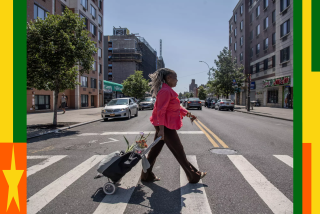Congress OKs 3 More Weeks of Daylight Time
Legislation that would provide an extra three weeks of daylight-saving time in the spring received final congressional approval Tuesday and went to President Reagan for his expected signature.
“Congress has seen the light and now Americans everywhere will see more light,” said Rep. Edward J. Markey (D-Mass.), a leading House sponsor of the bill along with Rep. Carlos J. Moorhead (R-Glendale).
By voice vote, the House agreed to accept the Senate-passed version of the legislation, which would advance the start of daylight-saving time from the last Sunday of April to the first Sunday of April. The expansion is scheduled to begin next year.
The original House bill also would have added another week of daylight time in the fall by delaying the switch to standard time from the last Sunday in October to the first Sunday in November. Sponsors argued that the later sunsets would have made Halloween trick-or-treating safer for children.
But Sen. Wendell H. Ford (D-Ky.), who said farmers and bus-riding schoolchildren in his state did not relish the prospect of hour-later sunrises in the fall, threatened a filibuster if that provision came before the Senate. So the House agreed to drop it.
A broad coalition of business, recreational and health interests helped speed the bill through Congress, which for 10 years had rejected proposals to expand daylight time beyond the current six-month period.
Boon for Outdoor Firms
Expansion “will mean several billion dollars to several industries that deal with the outdoors,” said attorney James Benfield, who headed the National Daylight Saving Coalition.
The coalition included the American Assn. of Nurserymen, the Barbecue Industry Assn., the Amateur Softball Assn., the International Assn. of Amusement Parks and Attractions, the National Assn. of Convenience Stores, the Sporting Goods Manufacturers Assn. and the Retinitis Pigmentosa (“night blindness”) Foundation.
Benfield said four groups in the coalition would be disappointed that Halloween was left out of the bill: the Chocolate Manufacturers Assn., the National Confectioners Assn., the National Candy Brokers Assn. and the National Candy Wholesalers Assn.
“But they will benefit some,” he said. “People will be eating more candy bars while they play more softball.”
Fought by Rural Groups
The legislation was fought by representatives of rural areas, especially those lying on the western edge of time zones, where mornings will be darker and colder than farther east.
However, Benfield contended that farmers will benefit more than they think.
“If you look at the barbecue and fast-food industry, the most popular food is beef,” he said. “With Americans consuming less and less beef, this might help turn things around.”
More to Read
Start your day right
Sign up for Essential California for news, features and recommendations from the L.A. Times and beyond in your inbox six days a week.
You may occasionally receive promotional content from the Los Angeles Times.






